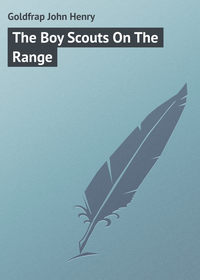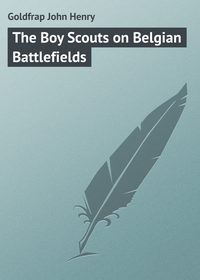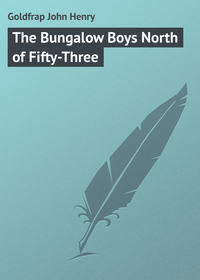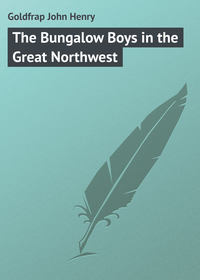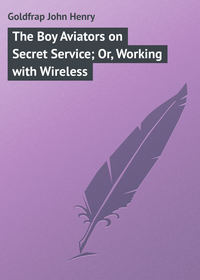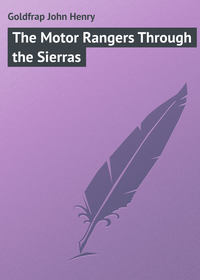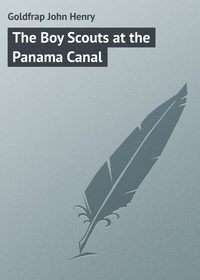 полная версия
полная версияПолная версия
The Boy Aviators in Nicaragua; or, In League with the Insurgents
Everybody on the plantation found some excuse to pass by the shelter that morning while the boys, and three or four envied laborers unpacked the Golden Eagle, and began to put the sections in place. A feature of the ship of which the boys were very proud was the ease with which, by a system of keyed joints, their beautiful sky-ranger could be taken apart or put together again very quickly. Under Frank and Harry’s coaching even the Nicaraguan laborers, none of the brightest of humankind, got along very fast, and by the time the second breakfast, as it is called, was ready the frames for the planes were in place and the trough-like cockpit or passenger car ready in position to have the piano wire strands of immense tensile strength that connected it to the steel stanchions of the planes screwed into place with delicate turnbuckles made especially for the Golden Eagle.
After lunch the work went on apace. The balloon-silk coverings of the planes were fitted with tiny brass ringed holes through which they were threaded on to the frames by fine wire. This was a tedious business and Frank and Harry did it themselves, not caring to trust so delicate an operation, and one which required so much patient care, to the good-natured, easy-going Nicaraguans, who would have been as likely as not to have scamped the job and left several holes unthreaded. As the whole pressure of the weight of the car and its occupants, fuel and lubricants was to be borne by these planes it can readily be seen why the boys placed so much importance on doing a good thorough job.
It took till sunset to complete this task and the boys were tired enough not to be sorry that their work was done when the big bell that called the laborers in from the banana groves began to clang.
In the work on the Golden Eagle the boys had been very materially aided by Billy Barnes, who photographed the craft from every possible and impossible point of view and insisted on Frank snapping a picture of him sitting at the steering wheel.
“It’s as near as I’ll ever get to steering her, I guess,” he explained, “I haven’t got the head for these things that you chaps have.”
It was Billy Barnes, too, who reported that evening in great excitement that while he was walking along the porch he had seen a big spotted cat “loafing around.”
“That wasn’t a cat,” laughed Mr. Chester, “that was an ocelot and if you think you can qualify as a Nimrod we will go out after supper and try and get a shot at it. They are bad things to have around the place – not that they are really dangerous, but they steal chickens and the men are scared of them and spend most of the day looking out for what Billy calls a ‘big cat,’ instead of doing their work.”
“I don’t know what or who Nimrod is,” replied the good-natured reporter, “but I sure would like to get a shot at that ossy – what do you call it?”
After supper the hunting party put on stout boots, coming well above their knees, in case of lurking snakes, and armed with rifles started out after the ocelot. Frank and Harry were both pretty good shots, having had a good deal of experience at their father’s camp in the Adirondacks in the days before he became a planter. Billy Barnes had never had a rifle in his hand before, but he didn’t say so. He opined that to shoot all you had to do was to look steadily at the object aimed at and then, pull the trigger.
“I think we’d better try for him over by Bread-Fruit Spring, sir,” said the young overseer as the party, as quietly as possible, sallied out.
“A good suggestion, Blakely,” replied Mr. Chester.
“Do they eat bread-fruit?” inquired Billy.
“No, but they drink water, Mr. Barnes,” replied Mr. Chester; “now, don’t let’s have any talking or we shall have our night’s work for nothing.”
Following Mr. Chester’s directions the party spread out in a fan-shape, as they neared the spring, and it was agreed that they should gradually draw in the ends of this “fan” as they neared the spot where they expected to find the ocelot. If any one got lost they were to shout or fire their rifle.
In pursuance of this plan the party carefully tiptoed along, stopping every now and again to listen carefully. Billy Barnes was far out to the left of the rest of the party and as they got deeper into the mysterious shadows of the tropical forest his heart began to beat a little faster than usual. The moon shone down through the immense tree-tops in a few patches, but outside of these circles of light-illuminated spots the jungle was as black as an unlighted cathedral.
Every time a creeper brushed against his face, Billy remembered all he had ever read of huge snakes that hung in trees and crushed people to death with their terrible constricting folds. Then, too, occasionally a sleeping monkey, disturbed by a bad dream or some preying night animal, would start off through the branches with a screech that sounded horribly human. Not for the world would Billy have let the boys or their father know that he was filled with a great longing for human company, but he devoutly wished he was back at the comfortable hacienda.
“A nice finish for the Planet’s special correspondent,” he mused. “William Barnes, Crushed to Death by a Boa Constrictor” – b-r-r-r – “that would look well in a head, wouldn’t it?”
Suddenly, as Billy emerged from a dark shadow cast by a huge tree with immense buttress-like roots, the space between any one of which would have served as a barn for a horse and buggy, he saw in the patch of white moonlight right ahead of him a sight that made his scalp tighten and his blood run chill.
Crouching over the body of a deer and tearing at it with low, snarling growls, was a thing that looked something like Billy’s “big cat,” but was much too large to have ever been mistaken for that peaceful domestic animal. The creature was too engrossed with its meal to pay much attention to the badly-scared boy, and if he had retained his presence of mind he might even have tiptoed off unnoticed, but at that moment the luckless Billy was impelled to sneeze.
As his loud “Ah, c-h-o-o!” sounded the animal lifted its head angrily. In the moonlight Billy could see its white, gleaming teeth and cruel eyes. It looked about, as if puzzled, for a few seconds, but suddenly its green eyes lighted on the petrified Billy, who was too scared even to run.
Instantly it crouched down on its belly and began lashing the ground with its tail. Its upper lip was pulled back in a snarling grin that disclosed its saber-like teeth and dripping fangs.
“It’s all off,” groaned poor Billy. He raised his rifle to his shoulder in a desperate sort of hope that it might scare the thing away.
“If I only hadn’t been ashamed to ask how the thing worked,” thought Billy.
As the thought flashed across his mind the animal with a loud, screaming snarl sprang directly at the trembling reporter. More from instinct than anything else he pulled the trigger and a loud report followed. It was a heavy sporting rifle that Billy carried and the unexpected recoil, which, not knowing anything about firearms, he had not prepared for, threw him off his balance. This saved his life for the minute, for as he reeled the huge creature he had disturbed at its forest meal shot past him so close that he could feel its warm breath against his cheek.
Foiled of its prey for the moment the maddened animal switched round with the agility of its kind and crouched for a fresh spring.
“Gee, now I know how a mouse feels,” gasped poor Billy to himself, as the huge creature prepared for what Billy felt was to be its death-spring.
With an agility born of desperation the youth made a wild leap for a hanging tendril of one of the giant creepers that festooned a tree near by. He caught it and began climbing with a skill he never knew before he possessed. He was beginning to think that he could at least reach a branch of the tree where he would be out of his savage opponent’s reach, when something happened that threw him into a cold sweat.
He felt the creeper begin to sag. It was breaking under his weight. In vain he tried to brace himself against the tree trunk. His knees slipped and slid and he could get no foothold.
Suddenly, without any warning, the creeper snapped. With a wild shriek of real terror Billy was hurled to the ground. His last conscious thought was of his old home up in New York State and of who would tell his mother of his fate.
Then like a man in a dream he saw a flash of fire so near at hand that it almost scorched his face. He heard a loud report and a snarling growl of pain and felt something warm and heavy fall with a crushing weight on top of him. Then everything went black.
When he came to he found himself in the center of an excited group. Everybody was shaking Frank’s hand and congratulating him, and the boy, looking very embarrassed, was trying to head off the tide of compliments.
“Oh, you’re all right, then,” exclaimed Harry as Billy opened his eyes on the group in the moonlight.
“W-w-what happened?” gasped Billy, “didn’t that critter get me?”
“No, thanks to Frank,” exclaimed Harry impulsively; “you owe him your life, Billy. He heard your first shot and hurried to your aid and just in time. The critter didn’t get as you call it – didn’t get you, but Frank got the critter.”
“As pretty a shot as I ever saw,” remarked Mr. Chester.
“Oh, pshaw,” said Frank, “I couldn’t help hitting him, he looked as big as an elephant; and besides, if I hadn’t got him he’d have got me.”
“What the dickens was the thing?” inquired Billy, “a lion or tiger?”
“No, but something quite as dangerous – a jaguar,” replied Mr. Chester, “and as big a specimen as I have ever seen.”
He stirred the magnificently spotted hide of the dead wild beast with his foot as he spoke.
“Frank!” exclaimed Billy, with tears springing to his eyes and real emotion in his voice, “you saved my life to-night.” Frank put up a protesting hand.
“No, I will say it,” impulsively burst out Billy. “I owe you my life and by jimminy crickets,” wringing Frank’s hand like a pump-handle, with a hearty grip, “I’ll never forget it. Maybe some day I can do something to repay you, and when that time comes count on Billy Barnes.”
How soon the boys were to be in dire need of that help, neither they nor Billy Barnes dreamed as discussing Billy’s narrow escape and Frank’s brave shot they made their way back to the house.
CHAPTER VII.
FEATHERING THE GOLDEN EAGLE
Bright and early the next day the work of completing the erection of the Golden Eagle went on. The lower planes were covered and threaded on to the frames with the same care as the covering of the upper set had been accomplished.
The long bird-like balancing tail was then put in place and the tiller lines – of bronze rope – threaded through guiding pulleys to its planes which were designed to raise or lower the course of the ship when in the air. The lateral steering was accomplished by means of double vertical rudders of the thinnest bronze obtainable, strengthened by a triangular frame of aluminum, and were controlled by a clever device of Frank’s from the same wheel that adjusted the horizontal planes.
Then came the pleasant work of fitting up the car. There was a box for Frank’s binoculars and separate compartments for each of the instruments used in determining height and speed. Then the thermometer had to be screwed in place and the automobile clock adjusted where the steersman could see it. The food basket was then stocked, for Frank did not believe in doing things by halves and he was determined that when they quit work that night that everything about the ship should be in ship-shape fashion and ready for flight at a moment’s notice.
In the food basket, besides the blankets and medicines already mentioned and some folding knives and forks, the boys packed:
Four pounds of beans, a small box of hardtack, a plentiful supply of soup and meat tablets as used by the German army and which contain a supply of nutriment far in excess of their bulk, five pounds of bacon, the same quantity of ham, tins of salt, pepper and seasoning, a can of butter for special occasions and two cans of condensed milk, and five packages of self-raising flour.
“There doesn’t look to be enough there to feed a flock of canary birds,” remarked Billy, as he watched the stowing of the grub.
“That’s because you don’t know the exact science of modern rations,” replied Frank, “experiments in Germany have proved that the condensed soups and meat essences we have in that are alone capable of sustaining life for a long period, the other things are luxuries.”
“Well, me for porterhouse steaks and food you can get your teeth into,” replied Billy. “Count me out on this tabloid table-d’hôte idea.”
“It’s easy to see you were never cut out for an aeronaut,” laughed Harry, “here, lay hold of this bar and make yourself useful.”
The body of the car was raised on screw-jacks, when the work of attaching it to the planes had been completed, and the food basket carefully slung underneath, where it was readily getatable through a small hinged hatch in the floor of the pilot’s cockpit. Then came the work of attaching to the bottom of the frame, and to the tail, the wheels and spring braces which were devised to make a descent in the airship as easy as alighting from a taxicab. The wheels were also to aid in starting the craft.
Frank and Harry had come to the conclusion long before they finished building the Golden Eagle that they did not want to have to cart around a runway with them to give the ship start when they wished to make a flight, as is the case with the Wright Brothers’ machines. Their air craft was equipped with pneumatic tired-wheels like those of a bicycle, only several times as strong, in order to give her a good running start when her twin propellers were started.
When they wished the Golden Eagle to soar aloft from the ground, all that was necessary to do with this equipment was to throw in a clutch geared to the rear pair of wheels and the Golden Eagle, like a great bird with her wings spread, began to glide over the ground, and in a few seconds the pressure of the air under her curved planes gave her the necessary lift and she shot up like a hawk, or her namesake, leaving the eyrie.
The forward pair of wheels were movable, castor-fashion, so that when the ship struck the ground they were free to head in any direction in which the ship might take the earth. The rear wheels were attached to the body of the aeroplane in the same manner, except that they had a device connected with them which made it possible to lock them when the operator wished to throw in the clutch that started the engine up. The forward wheels also had a detachable steering appliance connected with them so that in starting the machine it could be steered in any direction the operator desired, like an automobile.
Besides these wheels the forepart of the Golden Eagle possessed a pair of inclined planes moving on an axis. To the outer ends of these planes were attached powerful springs. The action of these planes when the forward end of the ship struck the ground on them was of course made free from jar by the spring attachment which acted as a sort of buffer. The wheeled arm attached to the bird-like tail astern was geared in a similar fashion and was designed to support this important part of the aeroplane and protect it from damage when the Golden Eagle settled.
Frank eagerly explained the uses and action of all the devices to his father and Jimmie Blakely, the latter of whom had neglected his work shamefully since the Golden Eagle had been roosting under its palm-thatched shed. How the ship got its name was at once apparent as soon as the boys had completed covering its wings. The balloon silk they used was of a rich orange hue and indeed the ship looked like nothing so much as a great golden bird.
The last task the boys had to tackle was the delicate one of placing the engine and its condenser in position and connecting it to the gasolene, water and lubricating tanks. Then there was the job of putting in the ignition apparatus and wiring it up to the spark plugs of the motor. Frank and Harry used the jump-spark system as being both simpler and easier to repair in time of trouble than the make and break method. The spark for starting was obtained from batteries, but when under way the Golden Eagle’s engine was “sparked” by a magneto. Both boys always carried a supply of extra spark plugs in case of the carbonization of the ones already in the cylinders and they had had very little trouble indeed with this important part of their engine, one which gives more bother usually than any other part of the motor. The spark plugs were hooded with waterproof caps as a precaution against short-circuiting by rain or dampness.
The twin propellers of the Chester boys’ craft, four-bladed ones of bronze, framed and covered with specially prepared and varnished fabric. These frames were internally braced by specially tested steel wire and had shown themselves in every way capable of standing the terrific strain that 1200 revolutions a minute put on them. The shafts connecting them with the engine were of the best Tobin bronze, a non-corrosive material and one of the most suitable metals for the construction of propeller shafts.
It took Frank and Harry the best part of another day to adjust the engine to its bed and true up all its connecting parts with spirit-level and plumb-line. This work they had to do alone as it required expert knowledge of the most exhaustive kind.
At last, however, everything was adjusted and screwed in place in a way to satisfy even the critical Frank, who went over every joint and fastening with an eye that spied out immediately the slightest weakness. When everything was announced to be complete at last, a holiday was declared on the estancia and all hands gathered round the palm-thatched shed to watch Frank and Harry tune up the Golden Eagle’s engine.
Frank’s eyes fairly shone as he stepped lightly into the car and opened the valve that sent a flow of life-giving gasolene along a brass tube to the carbureters.
Before he did this, however, the hands had been busy for an hour filling coffee bags with earth and heavy stones and piling them down on all sides of the Golden Eagle. Stout stakes were also driven into the ground and the craft securely roped to them in such a way that she could not free herself when her propellers began to whiz round.
“Now, then, hold tight, everybody!” shouted Frank, as he “tickled” the carbureter, and Harry threw in the switch. The Boy Aviator gave the flywheel a light twist back against the compression – there was a loud “bang,” that made the women shriek and the next minute the engine of the Golden Eagle was purring away as contentedly as if it had never been separated from the craft of which it was the heart and packed up for its long voyage.
But the natives, – where were they? With the exception of one tubby little fellow who was sprawling on the ground and who scrambled to his feet and made off at top speed as soon as possible, there was not one to be seen of all the crowd that had clustered round the Golden Eagle but a few minutes before.
They had not heeded Frank’s warning cry, – somewhat naturally, not understanding it, – and when the huge propellers began to whirl round, creating a regular whirlwind in which hats were snatched from heads, and dresses blown every which way, they had, with one concerted howl of “Witchcraft,” fled to their quarters, where only a great deal of persuasion induced them to leave.
By supper time that night, the boys were delighted to think that their beautiful craft was ready to soar again. Everything in fact was ready for an immediate flight. The sand-bags were removed, the ropes untied from the stakes, and the batteries carefully seen to. It was with light hearts that the boys hurried to the house for their evening meal. As for Billy, he danced a sort of what he was pleased to call a “Pean of Triumph,” round the ship. The performance of the engine and the general trim and trig appearance of the Chester boys’ flyer had aroused him to such a height of admiration and enthusiasm that he declared himself quite willing to take a trip in it himself – which was “going some” for Billy.
CHAPTER VIII.
BILLY BARNES TAKES THE WARPATH
The next day Frank and Harry busied themselves in their father’s laboratory during most of the morning. They had been delighted to find such a completely equipped repository of chemicals as it proved to be, and their admiration of their father’s researches was only equalled by their natural surprise at finding such a workshop on a Nicaraguan plantation.
“I always knew you were a great dab at chemistry, father,” remarked Harry, “but I never dreamed that you had a regular Institute of Scientific Research on tap.”
“By the way,” asked Frank, who had been busy taking stock of the various chemicals, “have you any picric acid here, father?”
“I believe I have, my boy,” replied Mr. Chester, “but that’s dangerous stuff to fool with. You know it’s a high explosive.”
“Perfectly,” rejoined Frank, “and it’s for that very reason I want it.”
“I confess I don’t understand you,” was his father’s reply.
“It’s simply this,” replied Frank, with a smile at his bewilderment, “it has become a by no means uncommon practice, though of course most of the better class clubs have made rules against it, to mix picric acid with gasolene in racing motor boats and air crafts. It is usually very injurious to the engine, however, and I don’t suppose any one would want to use it except in an emergency.”
“What do you want it for, then?” asked his father in surprise.
“Well, I believe in always looking ahead, for very often it’s the unexpected that happens,” rejoined Frank. “Our engine now can turn up 1200 revolutions a minute. I believe that with the use of picric acid in the gasolene we could give her as much additional power as 1500 revolutions a minute.”
“Well?” inquired his father expectantly.
“That being so,” went on Frank, “the Golden Eagle would have just that much more lifting power, the stability of an airship depending upon the speed at which she travels through the atmosphere. So you see,” he concluded with a smile, “that some day we might want to carry an extra passenger and in that case a gallon of picric acid would come in mighty handy.”
After a little more argument Frank won his point, and that night the boys stored aboard the Golden Eagle– after first carefully seeing that it was not in a position where it was likely to prove dangerous – a stone carboy of the explosive acid. They had hardly completed the work when the sound of wheels was heard on the drive, and when they reentered the house they found that Don Pachecho and his beautiful daughter were the visitors.
Señora Ruiz showed plain evidences of her suffering over the news of her husband’s death. The boys, who had heard of the disastrous battle from their father, avoided all reference of course to the revolution, but it was Don Pachecho himself who brought the subject up.
“Have you heard the latest news of the revolution. Señor?” he asked, after the introductions were over, and Billy had whispered to Harry what a fine photograph of “an old Spanish don” Mr. Chester’s neighbor would make.
Mr. Chester shook his head. Indeed, since a couple of days before the man who carried messages and letters between the hacienda and Greytown, had reported that Zelaya’s forces had cut the telegraph wires and taken complete charge of the cables, the party at the plantation had heard nothing of the movements of either the insurgents or the troops of the government.
“I learned from a party of rubber-cutters who passed the plantation to-day,” went on Don Pachecho, “that Estrada’s troops have suffered a further defeat and that Zelaya’s men, under General Rogero, crazed with their victories are burning and destroying property and committing all sorts of outrages everywhere.”
“Where was this last defeat?” asked Mr. Chester, seriously.
“It cannot have been more than fifty miles from here,” continued Don Pachecho, “that is what makes it so ominous. It means,” he went on, his voice rising, “that if Estrada cannot hold them in check that the government troops will drive him back on Greytown within a few hours and then you know what will happen,” he shrugged his shoulders.




